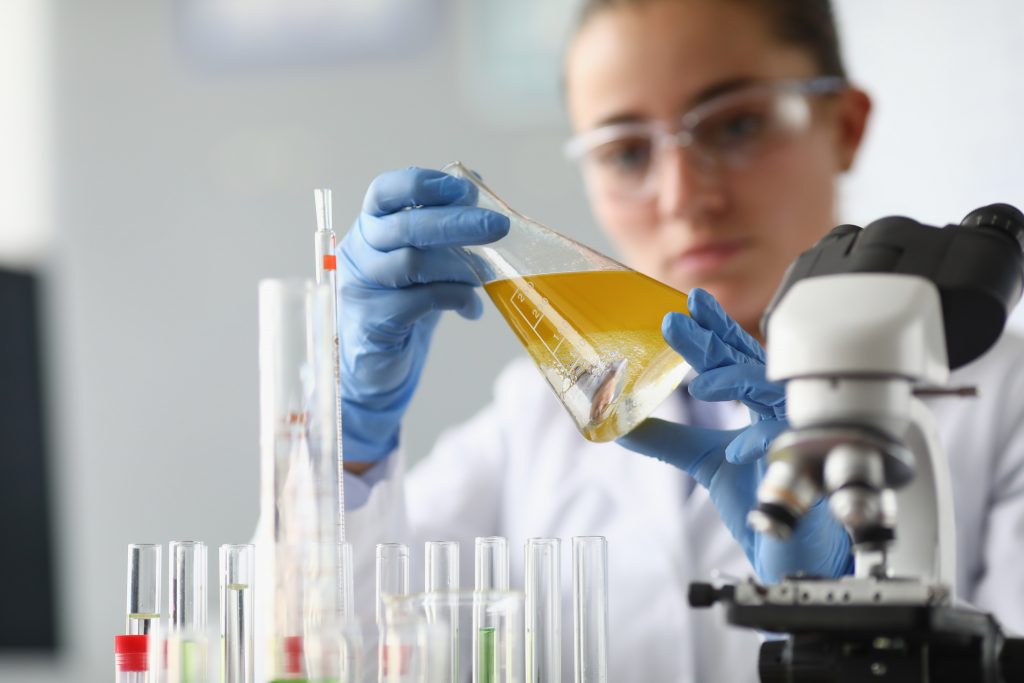If you have a knack for math and science and a desire to come up with new solutions to society’s problems, then you might be interested in a career in chemistry. Chemists are the scientists who research substances at the atomic and molecular levels. They study their properties, components, chemical structures, and interactions with other substances. These skilled researchers create and test new substances used in:
- medications
- manufactured goods
- consumer products
But to become a chemist, you must earn a chemistry degree. A college education is essential to beginning your career as a chemist.
Education for Chemist Careers
What degree do you need to be a chemist? The first step to a career as a chemist is earning an undergraduate degree. Bachelor’s degree programs in chemistry are sufficient to prepare students for entry-level jobs in the field of chemistry. Because the chemistry major is ubiquitous at schools across the United States, ample programs are available.
What Is a Chemistry Major?
As a chemistry major, you will spend most of your time exploring ways that the elements on the periodic table combine, interact, and react. Classroom and laboratory coursework will be required. Chemistry students:
- conduct experiments
- contribute to ongoing research
- gain knowledge and skills that help them contribute to various fields of science and medicine.
Common Coursework Chemistry Majors Complete
General courses in science are associated with the chemistry major. Students majoring in chemistry take foundational classes in:
- biology
- chemistry
- physics
Students gain hands-on experience in research that better equip them for the workforce. Depending on the chemistry track classes may vary. Common chemistry tracks may include:
- Biochemistry track
- Pre-professional track
- Combined BS/MS track
Chemistry majors take classes that cover different topics associated with the field of chemistry. Course topics may include:
- Biochemistry
- Enzyme Analysis
- General Chemistry
- Organic Chemistry
- Physical Chemistry
- Solid State Structural Methods
- Special Topics in Chemistry
In addition to the above chemistry courses, several support courses may also be required. These courses include:
- calculus
- general physics
- probability and statistics
- statistical methods
Also, courses required in most chemistry majors have laboratory components. Students enroll in a course and its corresponding laboratory.
Undergraduate chemistry students should expect to spend a good deal of time studying computer science, as well, so that they will have the skills needed to use databases and modeling software and to run electronic laboratory equipment. Chemistry students will have the opportunity to gain hands-on experience through many lab projects. They can also add to their skills and their résumés by completing internships and assisting faculty on research projects.
How to Know if a Chemistry Major Is a Good Fit for You
Chemistry majors develop strong science and statistical analysis backgrounds. Before embarking on the major, you should ask yourself if chemistry is the right fit for you. Chemistry majors should be prepared to face challenging studies through coursework and labs. They regularly encounter intellectual challenges as they learn about:
- atoms
- electrons
- ions
- molecules
Chemistry majors gain a thorough understanding of medicine and are often prepared to pursue medical school. Beyond medicine and chemistry, students may find themselves prepared for careers in:
- academia
- government
- research
If you don’t want to major in chemistry, there are other useful majors for chemists. In fact, some of the best degrees for chemists other than chemistry itself are:
- Biology
- Geological and Earth Sciences
- Geophysics and Seismology
- Meteorology
- Paleontology
The above degrees for chemists touch on many chemistry courses taken by chemistry majors. In fact, most of the above disciplines require the completion of inorganic and organic chemistry classes, as well as biochemistry and other related topics.
Advanced Chemist Schooling
If you aspire to a research position, or if you want a leadership role on a research team, a bachelor’s degree probably won’t be enough to reach your career goal. You’ll have to earn at least a master’s degree for a research job and a Ph.D. for a leadership position. A master’s or doctoral degree program will build on the educational background you acquired in your undergraduate chemistry studies while giving you the opportunity to delve deeper into a subfield of chemistry. Popular research specialties include:
- analytical chemistry
- inorganic chemistry
- medicinal chemistry
- organic chemistry
Upon finishing your advanced degree to become a chemist, you will present your research findings in your master’s thesis or doctoral dissertation.
The Versatility of a Degree in Chemistry
In addition to preparing you for a career in chemical research, chemistry happens to be a top program for those students who are unsure what career path to take after college. The solid science background that a bachelor’s degree in chemistry provides is very versatile. Science professionals find work in a wide range of industries, from architecture and engineering to paint and rubber manufacturing, and from petroleum oil and gas extraction to computer systems design.
A career in chemistry is a rewarding path. Not only do chemists have the opportunity to make a difference in medicine, manufacturing, and the products we use on a daily basis, but they also earn high salaries. Below, we discuss the earnings potential and job outlook for chemists.
Other Important Qualities for Chemists
After learning what degree does a chemist need, it’s time to evaluate skills not necessarily taught in the classroom. Employers look favorably upon soft skills. These are personal attributes that are desirable in all professions. For a chemist, these soft skills might include the ability to communicate effectively or exhibit strong leadership while managing a team of scientists. While some skills may be honed in college or through experience, others can be more innate. Here are a few important qualities that can make your work as a chemist successful.
- Analytical skills: Chemists must conduct scientific experiments and carry out studies. Lab work calls for precision and accuracy. For chemists to be successful on the job, they must be able to conduct precise experiments. Errors will invalidate their research, which can cause major problems with manufacturing and production.
- Communication skills: A good and effective communicator is hard to find. But, with solid communication skills in the science world, you can go far. Chemists with superior communication skills are valuable team members. These chemists must:
- read and write technical reports
- deliver presentations
- communicate clearly to individuals other than fellow scientists
One of the most important soft skills for a chemist to have is being able to effectively communicate.
- Interpersonal skills: Since chemists are researchers, and researchers often work on research teams, one must be able to work well with others. Chemists, especially those managing or leading research teams, must be able to motivate, encourage, and direct team members.
- Organizational skills: Organizational skills are important in any role, but as a chemist, these skills are very necessary. Chemists must document their lab work, processes, and data. They must adhere to industry practices and procedures while following regulations.
- Problem-solving skills: Chemists are problem solvers by nature. Their work requires extensive trial and error. Often, chemists conduct lab work that requires several mistrials before finding what works. They must not become discouraged. They must be willing to persevere until they find a viable solution. As stated above, chemists solve problems all day long. It’s an important aspect of their role.
- Time-management skills: It’s not uncommon for chemists to operate on tight deadlines when conducting research. In fact, chemists must be able to manage their time and prioritize projects. While operating on tight deadlines, they must also be able to work efficiently and safely. Their quality of work is just as important as meeting deadlines.
Earnings Potential for Chemists
Chemists earn a good wage. In fact, chemistry is one of the higher-paying fields of science. According to the Bureau of Labor Statistics (BLS), the median annual wage for chemists is $79,300. The lowest 10% of earners in this occupation make less than $45,000, while the highest 10% make more than $139,000.
According to BLS, there are five top-paying industries for chemists. With a degree for chemist jobs, and some experience, you’ll likely qualify to work in one of these high-paying industries. Below are the highest-paying industries for chemists and their median annual wages as reported by BLS.
- Federal government (excluding USPS): $116,990
- Research and development in engineering, life, and physical sciences: $92,410
- Chemical manufacturing: $77,760
- Administrative, support, waste management, and remediation services: $66,700
- Testing laboratories: $59,380
Two of the five highest-paying industries for chemists offer higher earnings than the overall average for this occupation, according BLS. In fact, the federal government and R&D both pay significantly higher wages than the average of $79,300 for chemists.
In addition to industry type, geographic location also impacts earnings for chemists. This means that your wage can vary by where you live.
Top-Paying Locations for Chemists
According to the Occupational Employment and Wage Statistics data published by the BLS, there are five top-paying states for chemists.
- District of Columbia: $129,900 (annual mean wages)
- Maryland: $119,730
- Delaware: $110,460
- Virginia: $103,290
- Rhode Island: $103,050
With the average annual wage for chemists of $79,300, the above states offer much higher-than-average wages for this occupation. In fact, D.C. offers $50,600 more per year than the average annual wage for chemists working elsewhere in the United States.
Certain metropolitan areas also serve chemists well by offering higher-than-average earnings. According to BLS, 10 metro areas offer the highest wages for this occupation. Five of the top-paying metro areas include:
- Peoria, IL: $134,990
- Washington, D.C.-Arlington-Alexandria: $130,860
- San Jose-Santa Clara-Sunnyvale: $122,250
- Barnstable Town, MA: $114,480
- Kennewick-Richland, WA: $112,410
In the top-paying metro areas, chemists earn above-average wages. In fact, Peoria chemists are among the top 10% of high-earning chemists in the country. This means that chemists working in the metropolitan area of Peoria earn higher wages than 90% of all other chemists.
But you don’t have to live in a metro area to earn higher-than-average wages as a chemist. In fact, BLS reports five top-paying non-metropolitan areas for this occupation. According to BLS, the Coastal Plains region of Texas is the highest-paying non-metro area for chemists. In this area, chemists earn an annual mean wage of $121,060. Other high-paying non-metro areas include:
- Northern New Mexico non-metro area: $113,210
- Northwest Oklahoma non-metro area: $108,930
- West Texas region of Texas non-metro area: $107,770
- North Texas region of Texas non-metro area: $107,020
Some people want to live in non-metro areas due to a lower cost of living. As a chemist, you can still earn above-average wages by working in one of the top-paying non-metropolitan areas.
Job Outlook for Chemists
In addition to top wages enjoyed by individuals in this occupation, a favorable job outlook is expected for chemists over the next several years. In fact, BLS projects a growth rate of six percent in overall employment for this occupation through 2030. The average growth is almost as fast as the average for all other occupations, making the industry stable for those seeking employment.
According to BLS, approximately 9,100 new job openings for chemists are projected each year over the next 10 years. These job openings should result from the growing need to replace workers who retire or transfer to different occupations. However, certain factors will impact the overall job growth, either slowing it or speeding it up. These factors include industry type and geographic location.
Certain industries, such as pharmaceutical and medicine manufacturing, will require more chemists. In these industries, chemists will be needed to develop nanotechnology for medicinal uses, according to the BLS. Additional chemists will also be needed in chemical manufacturing. This industry will hire chemists over the next 10 years to help improve environmental safety in the workplace and community. If you’re interested in pursuing a career as a chemist in one of these areas, your job prospects should be favorable.
BDP Staff
Related Resources:
- 30 Great Small Colleges for STEM Degrees 2022
- Online Bachelor’s Degree in Health Science: 30 Best
- Top 20 Degrees for the Future
- Ultimate Guide to Science and Engineering Degrees and Careers




